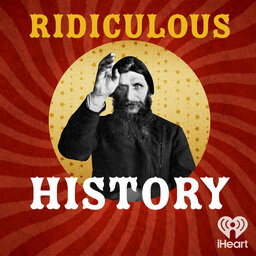What is Fudge, Part 1: The Science, The Curious Name
Nowadays, most people in the global West associate fudge with the idea of a homemade, homely confection. Yet once upon a time, this dangerously delightful, sugar-laden snack was the domain of the elite. Learn more about the origin of fudge here -- and tune in for part two of our series: Fudge As Rebellion.
Learn more about your ad-choices at https://www.iheartpodcastnetwork.com
In 1 playlist(s)
Ridiculous History
History is beautiful, brutal and, often, ridiculous. Join Ben Bowlin and Noel Brown as they dive int…Social links
Follow podcast
Recent clips

CLASSIC: The Tragic Origin Story of Morse Code
34:52

The Secret World Of Roald Dahl, with Aaron Tracy, Part Two: the Man Behind the Author
35:10

The Secret World Of Roald Dahl, Part One: A "Noisy" Life
36:40
 Ridiculous History
Ridiculous History